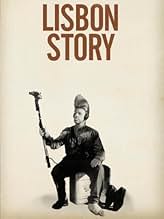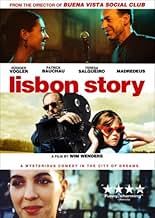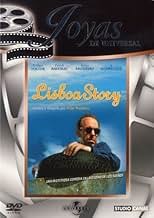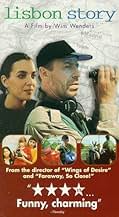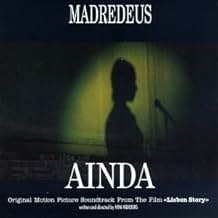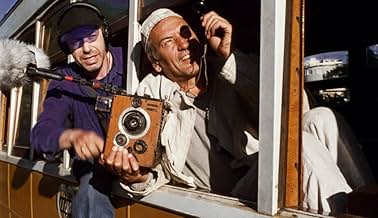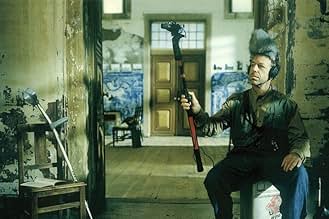अपनी भाषा में प्लॉट जोड़ेंThe director Friedrich Monroe has trouble with finishing a silent b&w movie about Lisbon. He calls his friend, the sound engineer Phillip Winter, for help. As Winter arrives Lisbon weeks lat... सभी पढ़ेंThe director Friedrich Monroe has trouble with finishing a silent b&w movie about Lisbon. He calls his friend, the sound engineer Phillip Winter, for help. As Winter arrives Lisbon weeks later, Monroe is disappeared but has left the unfinished film. Winter decides to stay, becaus... सभी पढ़ेंThe director Friedrich Monroe has trouble with finishing a silent b&w movie about Lisbon. He calls his friend, the sound engineer Phillip Winter, for help. As Winter arrives Lisbon weeks later, Monroe is disappeared but has left the unfinished film. Winter decides to stay, because he is fascinated of the city and the Portuguese singer Teresa, and he starts to record t... सभी पढ़ें
- पुरस्कार
- 1 जीत और कुल 2 नामांकन
फ़ीचर्ड समीक्षाएं
When I came across a reference to this movie, I simply had to buy the DVD. Interestingly, I see that the intention of the movie was to capture the spirit of the city, and thankfully it does not do so from a touristic point of view.
It captures Lisbon at an interesting time for the country, some 20 years after the revolution and 8 years after Portugal joined the European Union. And also at a time where it was modernising fast. A few years prior to the shooting of this movie, there were very old buses and the old trams (Eléctricos) ran just about everywhere and up impossibly narrow and steep roads where you could reach out and touch the houses. Now, there are just a couple of heritage routes, and these are the eléctricos featured in the movie out of necessity. Today, the transport system is completely modernised and I can see the point of the movie in trying to capture the spirit of a city before it changes out of recognition.
The use of the group Madredeus to provide the music is, I think, quite inspired. To make a movie about Lisbon could have turned into a 'yawn' if it had used a cliché of Fado. Thankfully it didn't and used something more contemporary. And what a group! The music is haunting, so much so that I have now gone off and sought out their CDs! Teresa Salgueiro reminds me of those Portuguese girls I met as a youth, she is just perfect for the part.
As has been mentioned by another reviewer, the movie is a bit self-indulgent in an 'arty' type of way, but it IS entertaining.
Finally, I prefer the movie with the subtitles turned off. The movie has a pan-European flavour with various languages popping up and intertwining. I suppose I benefit that I can grasp the gist of Portuguese when it is being spoken, and the German in the movie is basic enough that most of us will have absorbed some of it from movies and TV. Teresa Salgueiro's voice is very clear to understand when singing to those who are trying to understand the language, and is a real pleasure to listen to. To someone who may never have visited Portugal, the use of children who are fluent in English might seem odd, but in general, the Portuguese (well, in Lisbon, especially so) have always been good English speakers and I find it entirely natural to find Portuguese schoolchildren who speak English as well as Portuguese.
Waiting for the supposed main character Friedrich, played by Patrick Bauchau, to show up in the film, eventually becomes a metaphor for those times in life when one waits for the "main event", and it's a long time coming. Life is what happens while we're waiting for life to begin.
Rudiger Vogler's Phillip gets to deliver a wonderful lecture to all pretentious artists everywhere who've lost their way, and to art film-makers like Friedrich, especially. We're so happy to hear him dressing down Freidrich, and doing so more articulately than we could have done, it gives this fairly slow-moving film a wonderful sense of resolution and direction.
A very human film about the ordinary, the magic in the ordinary, and the ability of film to convey that magic. Loved it.
The plot is pretty simple: Phillip Winter (Rüdiger Vogler) is a sound ingeneer for a German director who moved to Lisbon, and he receives a letter from his friend to come to Portugal and help him do this movie about the capital, through sound capturing of all the people, small noises, and even feelings that float in the air. Vogler accepts the challenge, and goes on a trip to Lisbon.
In the city, he gets acquainted with a local band, Madredeus (who perform a beautiful soundtrack for Lisbon Story), and some of the local kids... After a few weeks, he realizes he's in love with this town, so full of charm and emotion all over, and the rest I leave for you to see. There is also a bit of romance, between the main actor and Teresa, the lead singer of Madredeus (which is, in fact, a beautiful Portuguese girl).
Wim Wenders, as always, has great directing on this one, showing the places that we never thought that would contain so much beauty as they do. He's a great director, and this is a great picture, in a way of a documentary, but greatly captured.
Strong feelings are expected. Wonderful movie.
Then several months later, I watched it again, and was captivated by it, enjoyed it thoroughly, and found it to be a good-hearted, affectionate salute to motion pictures and by extension to art in general. Though the film's humor frequently borders on being downright corny, I couldn't help enjoying even that aspect because of the obvious good will with which it was presented. It feels refreshing to have a film-maker work so hard to amuse the audience! That in itself is a token of respect.
Wenders has made here a film that's slippery, puzzling, and that eludes the mind's grasp at every turn, yet in the end delivers a powerful and even joyful message. It takes a certain amount of courage to send a positive message to an audience these days--or even in 1994, when the film was released. I applaud Mr. Wenders and I applaud this film. I'm very glad I thought to watch it again--I will definitely see it again in future, too.
क्या आपको पता है
- ट्रिवियाOriginally intended to be a pure promotional documentary about Lisbon comissioned by the city. Director Wim Wenders added some fictional components to the film and created a story with a thin and simple plot line.
- गूफ़In Lisbon, Mr. Winter reads a loving air mail post card received from Teresa, touring with her musical group, Madredeus in Brazil [at around 1:09:29]. The card shows Rio and Sugarloaf Mountain. However the card is postmarked May (possibly June) 7, 1994 in Portugal.
- भाव
Phillip Winter: Listen. You have to guess what this is.
[makes sound of horse running]
Beta: A horse! He's afraid!
Zé: Yeah, horse!
Vera: That's it!
Sofia: He's running very fast! He's galloping!
Phillip Winter: Right. And who is always on a horse?
Zé: A cowboy.
Phillip Winter: Right. And now...
[makes sound of lighting a match]
Vera: A match!
Zé: He lights a match!
Phillip Winter: [makes sound of fire]
Sofia: What's that?
Zé: He makes a fire!
Vera: Yeah, he makes a fire!
Phillip Winter: Mmm hmm...
[makes sound of frying eggs]
Zé: What's that?
Sofia: He makes something to eat. Yes, a steak!
Zé: A steak!
Phillip Winter: [pauses] Nnnehh... This cowboy is... vegetarian. Listen again.
- कनेक्शनFeatured in The Sound of Lisbon Story (2007)
- साउंडट्रैकGuitarra
Traditional lyrics from the poets of Fado
Music by Pedro Ayres Magalhães and Rodrigo Leão
Performed by Madredeus
Produced by Pedro Ayres Magalhães for EMI - Valentim de Carvalho Música, Lda, Lisboa, Portugal
Published by Delabel Editions / Sacem worldwide except Portugal (SPA - Sociedade Portuguesa de Autores)
टॉप पसंद
- How long is Lisbon Story?Alexa द्वारा संचालित
विवरण
- चलने की अवधि1 घंटा 40 मिनट
- रंग
- ध्वनि मिश्रण
- पक्ष अनुपात
- 1.66 : 1
इस पेज में योगदान दें


